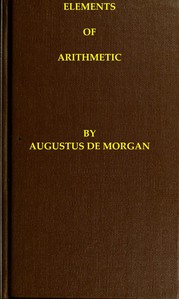Elements of arithmetic by Augustus De Morgan
"Elements of Arithmetic" by Augustus De Morgan is a mathematical textbook written in the mid-19th century. The work serves as a foundational guide to arithmetic, focusing on principles and reasoning rather than rote calculations, making it suitable for both students and educators. The text aims to establish a solid understanding of arithmetic concepts, laying out the basic operations, such as addition, subtraction, multiplication, and division, while emphasizing the importance of reasoning in
mathematics. The opening of the book includes a preface that outlines De Morgan's intent, stating that this edition contains significant appendixes aimed at aiding advanced students. It discusses the importance of teaching arithmetic through reasoning rather than mere routine and highlights the need for a rational approach to mathematics. Following the preface, the first section introduces numeration, illustrating how different counting methods were used throughout history with examples of simple counting techniques and their evolution into more complex systems, ultimately leading into structured numeral systems. This thoughtful approach sets a clear foundation for understanding arithmetic principles. (This is an automatically generated summary.)
Read or download for free
| How to read | Url | Size | |||
|---|---|---|---|---|---|
| Read now! | https://www.gutenberg.org/ebooks/68662.html.images | 840 kB | |||
| EPUB3 (E-readers incl. Send-to-Kindle) | https://www.gutenberg.org/ebooks/68662.epub3.images | 621 kB | |||
| EPUB (older E-readers) | https://www.gutenberg.org/ebooks/68662.epub.images | 623 kB | |||
| EPUB (no images, older E-readers) | https://www.gutenberg.org/ebooks/68662.epub.noimages | 288 kB | |||
| Kindle | https://www.gutenberg.org/ebooks/68662.kf8.images | 858 kB | |||
| older Kindles | https://www.gutenberg.org/ebooks/68662.kindle.images | 843 kB | |||
| Plain Text UTF-8 | https://www.gutenberg.org/ebooks/68662.txt.utf-8 | 513 kB | |||
| Download HTML (zip) | https://www.gutenberg.org/cache/epub/68662/pg68662-h.zip | 655 kB | |||
| There may be more files related to this item. | |||||
Similar Books
About this eBook
| Author | De Morgan, Augustus, 1806-1871 |
|---|---|
| Title | Elements of arithmetic |
| Original Publication | United Kingdom: Walton and Maberly,1858. |
| Credits | Richard Tonsing and the Online Distributed Proofreading Team at www.pgdp.net (This file was produced from images generously made available by The Internet Archive) |
| Reading Level | Reading ease score: 76.0 (7th grade). Fairly easy to read. |
| Language | English |
| LoC Class | QA: Science: Mathematics |
| Subject | Algebra |
| Subject | Arithmetic -- Early works to 1900 |
| Category | Text |
| EBook-No. | 68662 |
| Release Date | Aug 1, 2022 |
| Most Recently Updated | Oct 18, 2024 |
| Copyright Status | Public domain in the USA. |
| Downloads | 549 downloads in the last 30 days. |
| Project Gutenberg eBooks are always free! | |

